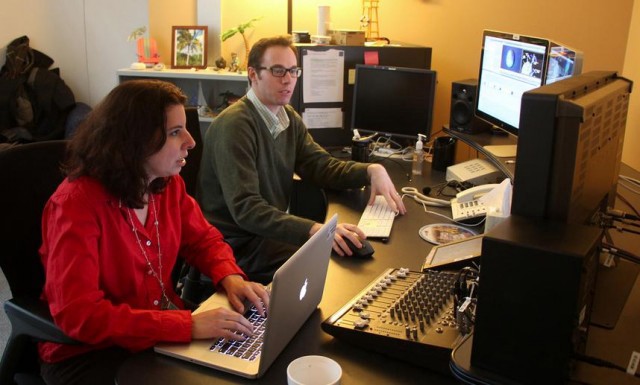The Value of ‘Free’ Work
by Christopher Tucker

I’m currently finishing up two video projects — both of them are for a couple of friends, so naturally I’m not charging them anything. Both of these individuals are looking to build brand new business enterprises, and one of them is a person whom I’ve known since he was a child; it’s crazy watching him run his own LLC.
While cutting footage, I can’t help but reflect on the many other free projects I’ve done over the years. These days, with all our plebian digital resources, anyone can be a graphic designer or media producer, making it easier to find people willing to do free work for a chance to break into an industry. There are Craigslist postings for social media interns; film shoots where cinematographers are promised a share of theoretical, extremely optimistic profits; businesses looking for college grads to design free websites for “experience.” But I ain’t giving away no secrets. This subject has been covered thoroughly at the ‘fold, and I suspect a large chunk of you readers know all about this.
Presented are the accounts of three free projects I’ve done, organized in a certain classic fashion. Names have been removed to protect the innocent/not-so-innocent:
THE GOOD
While working at one of my Portland video stores, I befriended the Iranian sandwich shop owner next door, who turned out to also be a self-made international pop star. For this fellow I made a charming and silly video centered on a young lady who had rejected the singer’s character’s marriage proposal. The actress in question was also a soldier at some point in her career, so it was easy to give her direction.
As goofy as it was, it gave me great producer experience. Also, it has been viewed way more than anything else I’ve ever posted, so that’s fun. And there were a multitude of gratis sandwiches (maybe that means this one doesn’t count as free).
THE BAD
When I first moved to Chicago, I spent a good amount of time replying to various video postings on various websites. Only two had any traction — one was a guy trying to obtain numerous editors for his docudrama about a male prostitute. We always met at the Harold Washington library, and he requested that the prospective editors give him their own external hard drives prior to any sort of contract being signed. He would put footage on the drives, and then we applicants would cut scenes as “tests.” I walked away from that one.
Another project was a comedic faux-film-noir short. Though it involved no money, I was excited — I figured it would be fun, I’d have additional material for my reel, and, most importantly, I’d meet film people and make some friends/connections.
None of these things happened.
The guy dropped all the footage off at my door and didn’t even enter my freshly cleaned apartment. That’s also how he grabbed the finished product. The material was dumb and amateurish — something I couldn’t wait to delete from my computer.
To be fair, he did give me a six-pack of New Belgium’s Belgo, a beer I absolutely adore and had never heard of before that project. Just thinking about that frosty dark bottle now makes me very, very thirsty.
THE UGLY
For this, we shift mediums.
Before Mike and Logan opened their cyber-doors and cyber-hearts to me, I applied to a content farm. When they responded that I was accepted, I was super psyched. The acceptance email was a form letter, but that was no big deal. Also, they had this “point system,” where getting specific amounts of hits unlocked specific achievements. In true video game fashion, they had a board showing all the leading scorers. I decided it looked fun, ignoring the whiny part of me that considered it condescending.
I got another form email following the posting of my first piece. There were a few mass emails (one of which attempted to get us to buy the website’s merchandise), but at no point did I ever receive a smidgen of personal communication.
After writing four pieces, I was feeling a little mixed. The pieces I wrote received way more hits than I’d come close to on my own site, and I thought they were pretty entertaining. But they were also all rather trite — nothing that would open any doors for me — and I was getting resentful about the lack of attention.
Then I submitted a piece about “Breaking Bad,” or rather the finales “Breaking Bad” had to beat in order to truly be the greatest show ever. This was entirely my idea, not one I grabbed off of the site’s “topics” list. Hours were spent in consideration. A friend of mine contributed info on some seminal shows I hadn’t seen. After it was over, I had put together a decent presentation of television criticism.
The article was posted, and I saw that instead of the title being “…finales ‘Breaking Bad’ must beat,” the editor had changed it to “…awful finales ‘Breaking Bad’ must beat.” Keep in mind, this was a list that included shows like “Six Feet Under” and “The Shield.”
So, I looked like an asshole.
Whether the editor changed it without reading a single word, or whether he thought clicks were more important than a disconnect of content and title, I cannot say. It did get more hits than my other pieces, and more comments, too: There were lots of people talking about how stupid I was, and what terrible taste I had in television, all because they looked at the items on the list and didn’t bother reading what I’d written. Someone said that he was so disgusted with my article that he nearly quit contributing to the site.
The Good, the Bad and the Ugly. With all that in mind, what, I ask, is the value of doing something for “free”? Sometimes, free is worth a great deal. You can help people you care about, or you can make great connections and get access to a whole new audience. Sometimes, free’s value is in the gutter. You feel exploited, you meet new people you never want to see again, and after all those hours you have nothing to put in a portfolio or demo reel. How can you tell just what sort of project it is going to be? As lots of you will attest, it’s just from terrible trial and error. Getting yourself in sticky situations, and hopefully learning from your mistakes. It’s just like dating.

The Good, the Bad and the Weird
Christopher Tucker lives and schemes in Chicago.
Photo: Goddard Studio 15
Support The Billfold
The Billfold continues to exist thanks to support from our readers. Help us continue to do our work by making a monthly pledge on Patreon or a one-time-only contribution through PayPal.
Comments